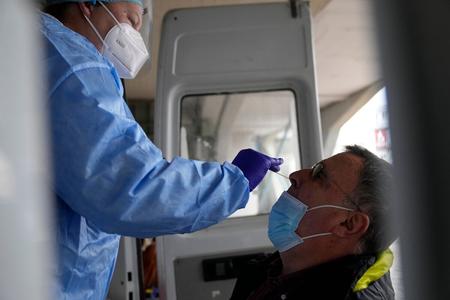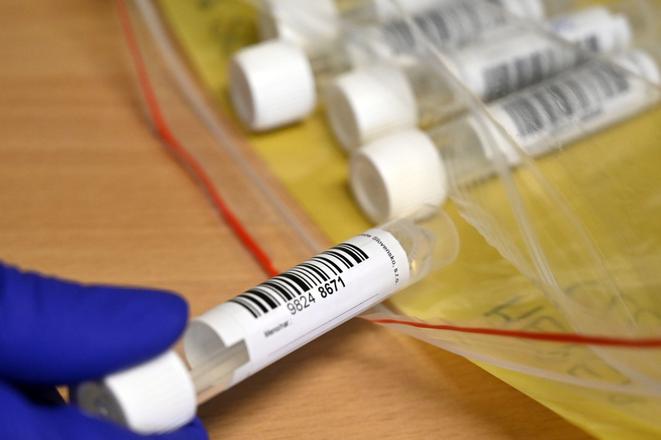Responding to the onset of the Omicron wave, public health officials have shortened the home isolation of people who test positive for the coronavirus.
Our paywall policy:
The Slovak Spectator has decided to make all the articles on the special measures, statistics and basic information about the coronavirus available to everyone. If you appreciate our work and would like to support good journalism, please buy our subscription. We believe this is an issue where accurate and fact-based information is important for people to cope.
Instead of the current 10 days, the quarantine will be cut to five days only, starting on January 25.
Anyone who tested positive before this day needs to follow the old rules for home isolation, i.e. self-isolate for 10 days.
Anyone who receives a positive test result (be it PCR, LAMP, antigen or home antigen test) will now be considered positive, and a confirmation with a PCR test result will not be required. The result of the home antigen test should still be discussed with a general practitioner.
One reason for such a change is the expected surge in positive cases and related shortage of PCR testing capacities.
Rules for those who test positive
Home isolation starts on the day the sample was taken or when the first symptoms appeared, but these symptoms do not prevent the person from working (such as high body temperature or intestinal and digestive problems). Symptoms should be discussed with a general practitioner.
In addition, people who were vaccinated against Covid more than nine months ago and have not received a booster, or recovered from the disease more than 180 days ago, need to self-isolate.
Clinical symptoms extended
The ÚVZ has extended the list of clinical symptoms of Covid that require home isolation, and the contacting of a general practitioner if a person develops them.
These now include:
body temperature higher than 37 degrees Celsius;
coughing;
night sweats;
fatigue;
sore throat and headache;
shortness of breath;
loss of taste and smell;
intestinal and digestive problems;
stuffy nose.
Every person under home isolation needs to remain at a place of isolation and prevent physical contact with other people, if possible. They should adhere to strict hygiene measures and cover their nose and mouth. They are also asked to monitor their health condition on a daily basis.
They are forbidden to meet people other than those living in the same household.
If they need urgent medical care, they should inform the healthcare provider about being under home isolation.
People who test positive should inform everybody with whom they were in contact within two days from when the sample was taken, or within two days from when the first symptoms appeared.
These people can leave their place of isolation only for medical treatment or testing. In this case, they are required to wear a respirator and wash their hands. They are also allowed to attend a funeral, but only if they have no symptoms. In this case, they have to maintain a two-metre distance at least from others and wear a respirator.
After the five days and if there are no symptoms preventing the person from working, everyone older than six years of age needs to wear an FFP2 respirator in public for another five days. This also applies to outdoors if the distance between those not living in the same household is less than two metres. Children can replace the respirator with face mask when at school or other school facility, as stems from an ordinance issued by the Public Health Authority (ÚVZ).
If the symptoms prevent the person from working, the isolation ends based on a doctor’s recommendation.
Rules for the vaccinated and recovered
Vaccinated or recovered person
a person who is fully vaccinated, meaning that:
*at least 14 days have passed since receiving the second shot of a two-dose vaccine, but not more than nine months;
*at least 21 days have passed since receiving the shot of a single-dose vaccine, but not more than nine months;
*at least 14 days have passed since receiving at least one shot of the Covid vaccine within 180 days from when the person recovered from Covid; but this person was not vaccinated more than nine months ago;
the person who received the booster;
the person who recovered from Covid in the past 180 days.
If there are no manifestations of symptoms in people who received the booster shot or were vaccinated not more than nine months ago, along with people who recovered from the disease in the past 180 days, then they are not required to self-isolate.
Yet, they are required to wear the respirator for seven days since their last contact with a person who tested positive, also outdoors (if the distance from other people not living in the same household is less than two metres). Children at schools and other school facilities can wear a face mask only.
These people are required to remain in home isolation if they develop any clinical symptom and their doctor says home isolation is necessary.
Close contacts
The ÚVZ ordinance now defines close contacts as people who were in touch with the person who tested positive, did not wear FFP2 respirator and:
were in direct physical contact;
or spent more than five minutes at a less than two-metre distance;
or spent more than five minutes inside or in an enclosed space;
or travelled on the same means of transport for more than five minutes.
These people who were in touch with a person who tested positive within two days before he/she received a positive test result or developed symptoms, need to stay in home isolation for five days, unless they have been fully vaccinated against Covid or recovered from the disease within the past 180 days and have no symptoms.
Not all close contacts will be required to take a PCR test on the fifth day after the close contact – the doctor will decide whether the test is necessary.
The home isolation of close contacts ends after five days since the last contact with the person who tested positive if they have developed no symptoms preventing them from work. In this case, everybody older than six years is required to wear a respirator in public for another five days (children can use masks when at school).

Special rules
The rules for people working in medical facilities and nursing homes who do not develop clinical symptoms remain unchanged. This means that they can also continue working if they test positive if there is a shortage of other workers in these facilities and it is impossible to ask someone else to take the job.
This rule also applies for critical infrastructure workers and state officials if their absence at the workplace endangers the proper operation of the place or state, and their work is necessary to handle extraordinary situations and tasks.


 Illustrative stock photo (source: TASR)
Illustrative stock photo (source: TASR)